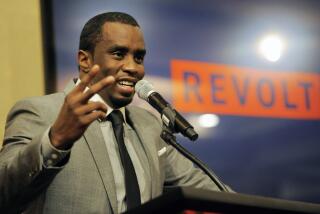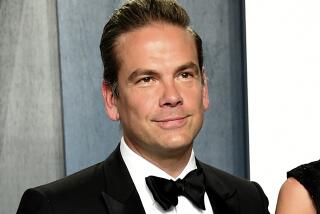Second BBC Official Resigns
- Share via
LONDON — After its second top-level resignation in two days, the leadership of the British Broadcasting Co. was in self-flagellation mode Thursday -- apologizing and promising reforms for mistakes made covering the government’s handling of intelligence.
BBC Director-General Greg Dyke resigned Thursday, following the lead of Gavyn Davies, who on Wednesday became the first BBC chairman in the company’s 82-year history to quit under such circumstances.
Under continuing pressure from 10 Downing Street, the 11 remaining members of the governing board issued a statement Thursday apologizing “unreservedly” for the BBC’s errors in a report alleging that members of Prime Minister Tony Blair’s inner circle distorted intelligence in order to take Britain to war in Iraq.
But the BBC’s humiliation did not prevent rank-and-file workers, former staffers, journalists and critics of Blair from mounting a counter-offensive, asserting that it was the government, not their beloved “Auntie Beeb,” that should don sackcloth and ashes.
Some commentators went so far as to warn that the effect of a senior judge’s report slamming the BBC could lead to long-term damage for one of the world’s oldest and most respected broadcasters.
The controversy bubbled in the wake of Lord Justice Brian Hutton’s findings on the circumstances surrounding the suicide of respected weapons scientist David Kelly.
Kelly had been the unnamed source of a disputed report by the BBC’s Andrew Gilligan on its “Today” program that said government officials had “sexed up” intelligence in order to sell a war in Iraq to the British public.
Shortly after he was named by the government as Gilligan’s informant, Kelly found himself in the center of a media firestorm, and he committed suicide.
After hearing weeks of testimony about the genesis of Gilligan’s report and the handling of intelligence by Blair and his then-communications director, Alastair Campbell, Hutton said the BBC was guilty of “unfounded” reporting and a “defective” system of editorial controls. He held Blair and his aides blameless.
As news of Dyke’s resignation spread, stunned BBC members across the country walked off their jobs in a “solidarity” protest -- saying the BBC was being made a scapegoat and made to grovel even though its original reporting was mainly correct.
Meanwhile, the right-of-center Daily Telegraph said the BBC’s very existence as a publicly chartered broadcaster could be at risk unless it rid itself of “an inbuilt soft-left bias.”
Noting that the company’s charter to operate as an independent but publicly funded broadcaster is up for renewal in two years, it warned: “The governors should act bravely today if they are to restore the corporation’s reputation; otherwise the negotiations over the charter could take a drastic turn.”
Some ministers would try to rein in the BBC, while others might even call for privatizing it, the paper predicted.
Martin Bell, a former journalist turned politician, said nothing less than the future of Britain’s free press could be at stake. “I profoundly hope that the BBC does not lose its nerve as a result of this reverse,” he said in a commentary in the left-of-center Guardian.
After Hutton’s report was issued, Blair’s office and Campbell demanded that the BBC retract the offending statements and draw lessons from it.
A spokesman said Blair had not been satisfied with an initial apology by Dyke on Wednesday. At the time, Dyke regretted errors but said the “greater part” of Gilligan’s reporting was accurate.
“In terms of what Greg Dyke said yesterday, it does not amount to a considered statement from the BBC governors, and that’s what we need,” Blair’s spokesman said.
Emerging from an emergency meeting, the new acting chairman of the BBC, Lord Richard Ryder, in effect surrendered.
“On behalf of the BBC, I have no hesitation in apologizing unreservedly for our errors and to the individuals whose reputations were affected by them,” Ryder said. “We have begun to implement major reforms, including outside journalists, compliance systems, editorial processes and training of new recruits.”
Rod Liddier, a former editor of the “Today” program who had a hand in hiring Gilligan, said he was appalled.
“I think Lord Ryder is a very, very dangerous thing for the BBC,” he said. “He has not a clue about journalism, and he has been a constant voice opposed to the BBC’s best journalistic instincts.”
Margaret Scammell, of the London School of Economics department of media and communication, agreed that it was a difficult time for the BBC, but she also said there were limits to the amount of BBC bashing by the government the public would allow.
“I think that both Gavyn Davies and Greg Dyke, when the smoke dies down, will receive considerable support from a wide spectrum of opinion for seeing their first duty was to protect the BBC’s independence,” Scammell said. “A government that moves strongly against BBC independence would have considerable problems .... The BBC can and will survive.”
*
Janet Stobart of The Times’ London Bureau contributed to this report.
More to Read
Sign up for Essential California
The most important California stories and recommendations in your inbox every morning.
You may occasionally receive promotional content from the Los Angeles Times.










